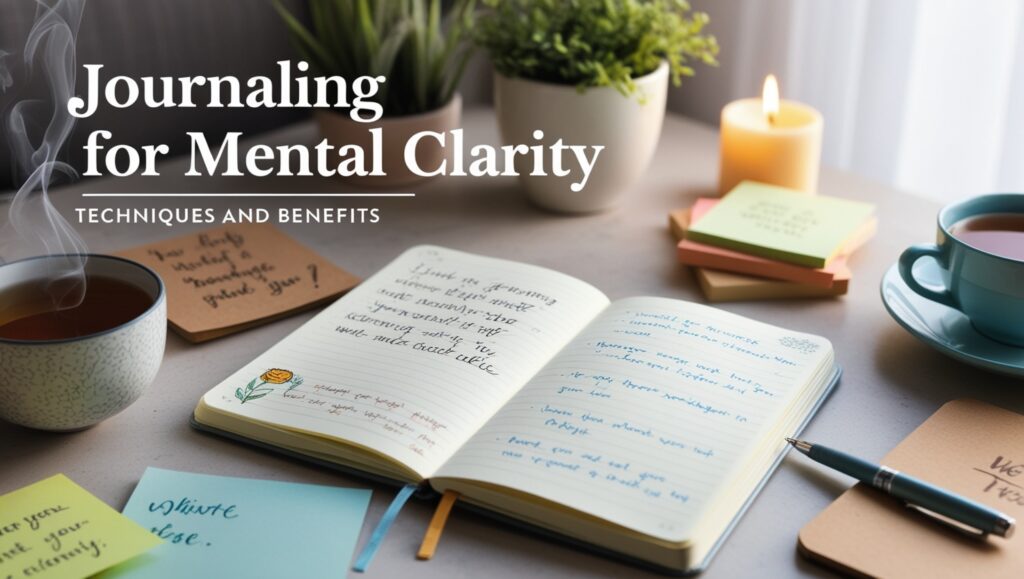Journaling for Mental Clarity: Techniques and Benefits
In our fast-paced world, finding mental clarity can be a challenge. With distractions and constant information overload, it’s easy to feel overwhelmed and confused. One effective way to declutter your mind and enhance your mental well-being is through journaling. This simple yet powerful practice can help you process your thoughts, reflect on your experiences, and gain insights into your emotions. In this blog, we’ll explore various journaling techniques and the benefits they offer for mental clarity.
The Importance of Journaling
Journaling is not just about writing down your thoughts; it’s a tool for self-discovery and personal growth. By putting pen to paper, you can articulate your feelings and experiences, allowing for a deeper understanding of your mental state. Regular journaling can help you:
- Reduce Stress: Writing about your feelings can help release pent-up emotions, reducing anxiety and stress.
- Improve Focus: Journaling can clarify your thoughts, helping you prioritize tasks and goals.
- Enhance Creativity: Free writing can stimulate creativity and allow new ideas to flow.
Journaling Techniques for Mental Clarity
1. Stream of Consciousness Writing
This technique involves writing continuously for a set period, usually 10-20 minutes, without worrying about grammar or structure. Allow your thoughts to flow freely onto the page. This method helps clear your mind of clutter and uncovers hidden thoughts and emotions.
2. Gratitude Journaling
Each day, write down three things you’re grateful for. This practice shifts your focus from negativity to positivity, promoting a sense of well-being and contentment. Reflecting on what you appreciate can help you cultivate a more positive mindset.
3. Prompt Journaling
Use prompts to guide your writing. Prompts like “What challenges did I face today?” or “What are my goals for the week?” can help you focus your thoughts and provide clarity on specific issues. These questions encourage deeper reflection and help identify areas for improvement.
4. Reflective Journaling
If you’re feeling particularly stuck, try mind mapping. Start with a central idea and branch out with related thoughts and ideas. This visual representation can help organize your thoughts and see connections you might not have noticed before.
5. Mind Mapping
If you’re feeling particularly stuck, try mind mapping. Start with a central idea and branch out with related thoughts and ideas. This visual representation can help organize your thoughts and see connections you might not have noticed before.
6. Mood Tracking
Keep a record of your emotions and moods over time. Note what triggered certain feelings and how you reacted. This practice can help you identify patterns in your emotional state and develop strategies for managing your mental health.
Benefits of Journaling for Mental Clarity
- Increased Self-Awareness: Journaling helps you become more aware of your thoughts and feelings, leading to greater self-understanding.
- Enhanced Problem-Solving Skills: By articulating your challenges on paper, you may find new perspectives and solutions to your problems.
- Emotional Release: Writing can serve as a healthy outlet for processing difficult emotions, promoting emotional healing.
- Improved Memory and Comprehension: Regularly writing about your experiences can enhance memory retention and understanding of events.
Final Thoughts
Journaling is a powerful tool for achieving mental clarity and enhancing your overall well-being in your career and daily routine. By incorporating different journaling techniques into your daily routine, you can develop a deeper understanding of yourself, reduce stress, and foster a more positive, resilient mindset. Whether you choose to write daily or occasionally, the key is to make it a meaningful and consistent practice that suits your lifestyle. Start your journaling journey today, and experience the transformative effects it can have on your mental clarity, personal growth, and emotional health!

